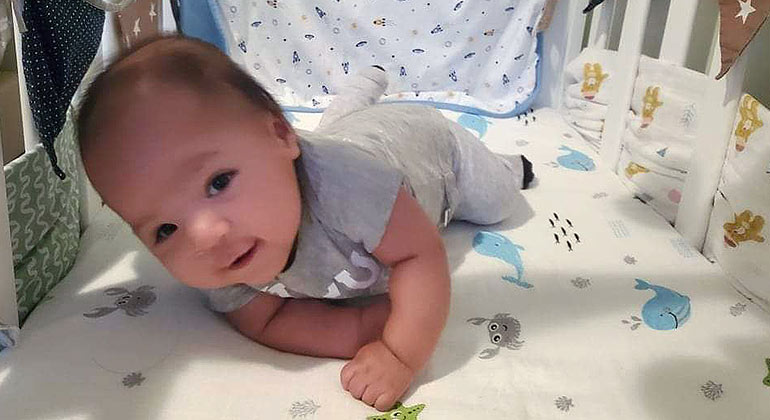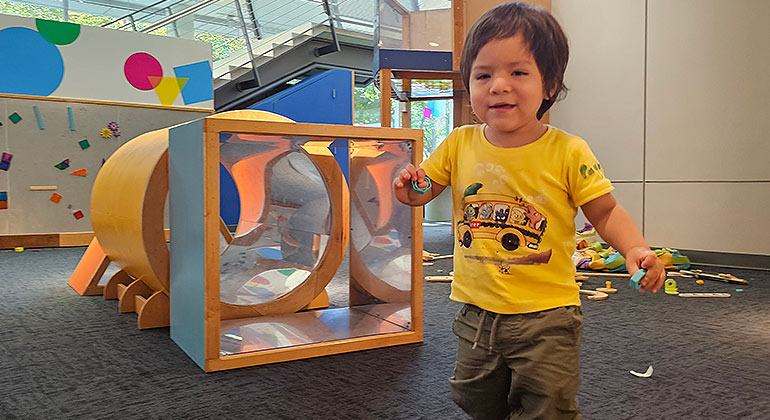
Preemie Fights for His Life—and Wins, With Support of Mount Sinai Team
Rosa Avalo Echeverria was in her office when her water broke, on February 4, 2021. That was the good news. As a City Research Scientist in the Occupational Safety and Health Administration Unit for the New York Fire Department, she could easily have been in a firehouse at the time. The less-than-than-good news was that Rosa’s pregnancy was only 24 weeks along. That meant the baby, Rosa’s firstborn, was coming early—about as early as an infant can be born and have a decent chance of making it.
An ambulance rushed her to Mount Sinai West to delay the early labor. On February 8, 2021, Rosa gave birth to a boy, by vaginal birth. (Most premature infants, or preemies, come into the world via Cesarean section.) “The doctor said he was healthy, with no infection,” explains Rosa. But he was tiny—1 pound and 11 ounces in weight, 32 cm in length. Unlike some premature babies, though, he opened his eyes right away. “The doctors couldn’t understand why he was born so premature,” Rosa says. Neither mother nor child had an infection, and there had been no pregnancy complications.
“An infant that young is like its own category of premature baby, because prematurity can be anything up until about 35 weeks,” says Sushma Krishna, MD, one of Paco’s neonatologists. Dr. Krishna is an Assistant Professor in the Division of Newborn Medicine in the Jack and Lucy Clark Department of Pediatrics at the Icahn School of Medicine at Mount Sinai. “At that gestational age, the risk is very high for mortality or adverse outcomes such as cerebral palsy or severe developmental delay,” Dr. Krishna says. “There are often complications with every single organ system.”
Immediately after the baby, Paco Vasquez Avalo, was born, he was transported to the Neonatal Intensive Care Unit (NICU) and hooked up to a variety of machines to help his lungs and heart function properly. “The NICU is essentially trying to mimic the conditions inside the mother,” Dr. Krishna says. “He had tubes in his belly button as well as the regular IVs in his arms and feet. That’s all to let us provide IV nutrition, blood transfusions, fluid therapy, and medications.” Paco was also on a ventilator to keep him breathing. “We monitored his heart rate, his oxygen level, his breathing rate, and his blood pressure, all 24/7,” says Dr. Krishna. Paco received multiple X-rays and brain scans. He also got blue light therapy to treat jaundice, which is common in preemies.
Paco was in the NICU for 140 days. Rosa and her husband, Alessio Alejandro Vasquez Loarte, spent just about every day in the NICU. “The hospital became our second home, and all the staff, from the doorman to the doctors, became our second family,” Rosa says. At one point, because of COVID-19 safety precautions, only mothers were allowed in the NICU, and only for an hour or two, which was hard on both parents.

A team of physicians worked to help Paco. This included a pediatric cardiologist, a pediatric pulmonologist, a pediatric gastroenterologist, a pediatric neurologist, and multiple neonatologists. “They were very friendly and very patient. They took the time to explain everything to us,” says Rosa. And because Spanish is the first language for both parents, the medical team arranged for translators, either by phone or in person, for these conversations.
“When this journey started, we were very anxious and scared, we didn't know how long we would be there,” Alessio says. “The doctors told us it would be a roller coaster, and they were right. Sometimes it got worse and sometimes it got better.”
“One of those bad days, when all the numbers on the screen were bad and the treatments seemed very painful and aggressive, I approached to him to tell him, ‘It’s okay, Paco. Everything is fine. You have shown that you are a great warrior. If this is very painful for you, don't worry about us; you don't have to keep fighting. We love you, and we will understand. Don't worry, my Paquito, don't worry.’” Alessio recalls. “Suddenly, at that very moment, his numbers on the screen began to recover, as if he was telling me ‘I want to continue; I still want to keep fighting.’ Paco showed us that he wants to live; he fought for his life. He changed my life.”
Dr. Krishna says Paco is lucky to have such supportive parents. “I can’t stress enough just how wonderful Paco’s parents were, in terms of their hope. They were always so grateful and appreciative to us as providers and always had such a positive outlook,” says Dr. Krishna. “I do believe that really makes a difference for patients.”
Paco is now at home with his family. He still requires outpatient therapies to support his development but is making significant progress. Rosa and Alessio are grateful to the Mount Sinai NICU staff. “Everyone was very important to us,” Rose says. She is grateful for the patience of the doctors, who explained everything, the social worker who always exuded calm and optimism, the nurses “with their blessed hands,” the receptionist who welcomed them every day, the cleaning service staff who made sure everything was clean. “Everything was very important,” Rosa says. “And we will always carry it in our hearts.”